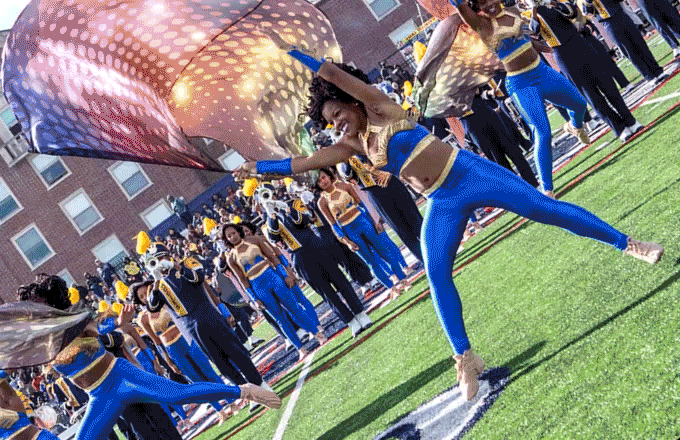
The importance that Historically Black Colleges and Universities [HBCUs] hold within African-American culture is immeasurable. Besides providing a safe space for young Black youth—where they can freely express the importance of equality and civil rights—HBCUs are a melting pot of style and swagger. From the clothing, to the camaraderie, to the sense of legacy; attending these schools gives its students a first-rate education and a chance to be a part of something bigger.
It should come as no surprise then that these colleges and universities have also been crucial to pop culture, spanning from the early ’90s and beyond. Schools like Howard University and Morehouse have been referenced in sitcoms, songs, and movies as the “it” places to be. Beyond mere mentions, some of the most popular movies are based on these schools, and feature a diverse cast of characters that closely mirror the lifestyles of the students that actually attend them. Just this past weekend, Beyoncé wowed Coachella Festival goers with an elaborate stage show that paid homage to America's HBCUs, from an energized marching band careening through her hits to a mid-performance skit showing a coming out ceremony for her "pledges," a long held tradition at many Black Greek letter organizations.
Understanding the impact that HBCUs have on African American youth, as well as influencing pop culture, The Home Depot has committed to revitalizing our HBCU campuses through its Retool Your School Campus Improvement Grant Program. To date, the program has awarded nearly $2 million dollars towards campus improvement projects to help sustain our nation’s HBCUs, ensuring that their legacy and contributions to the larger culture of the United States continues to evolve. In light of The Home Depot’s continued support of HBCUs, we dug into the pop culture archives to pick out some of our favorite HBCU references in TV, film, and music.
When Kanye West Showed Some “School Spirit”
View this video on YouTube
Kanye West’s debut album The College Dropout may be rife with scholastic bars and skits that exemplify his distaste with higher education, but “School Spirit” is a standout track that dives completely into the HBCU experience. The chorus itself is a call to arms (“Alphas, step! Omegas, step!”), and the lyrics themselves call back to the NPHC’s (National Pan-Hellenic Council) Divine Nine of African-American fraternities and sororities. The lasting influence of “School Spirit” is found within West’s acute understanding of how these organizations love to “step” to show off their pride—which also ties in with the title of the song. The brief asides where he calls out each fraternity/sorority by name was built for college parties, and, well, school spirit.
When The Notorious B.I.G. Shouted Out Howard’s Homecoming
View this video on YouTube
The late Notorious B.I.G. was a big fan of HBCUs, or at least their homecoming week—as evidenced by his line on “Kick In The Door.” His call out to Howard’s Homecoming in Washington, DC is one of the least paranoid things about the song, as he describes to the listener where they can find him and his boy Capone. While their activities there may have been purely “extracurricular,” the reference no doubt sparked interest for the uninitiated to the HBCU’s much publicized homecoming week, which is one of the most anticipated events of the fall every year.
The Real HBCU Bands Represented in 'Drumline'
View this video on YouTube
Charles Stone III’s 2002 drama/comedy Drumline was an eye-opening moment in describing the musical subcultures of the Black college experience. Starring Nick Cannon and Zoe Saldana, and taking place in the fictional HBCU Atlanta A&T University, the movie gives a peek inside the lives of students who are in the drum section of their marching band. From the fashion and music to the accurate depictions of the stresses of college, Drumline realistically illustrates what it’s like to attend an HBCU as the main characters face their rivals (real-life university Morris Brown College) as well as their own shortcomings. From the social dynamics to the relatable commentary on how young Black men and women are tasked with living up to the pressures put on them by their school and their community, Drumline still stands as one of pop culture’s most memorable examples of HBCU life.
'Stomp The Yard' Presented Real Depictions of Frat Life
View this video on YouTube
If Drumline took a deep dive into the musical lives of HBCUs, 2007’s Stomp The Yard was a deeper look into the brotherhood that is prevalent within the fraternity life at these institutions. There have always been very negative, and sometimes misinformed, stories about the behind-the-scenes struggles of these organizations but this movie, which stars Columbus Short, brought a more positive view of frats and sororities to light. Of course, the biggest reason people remember this film is for its depiction of “step” culture. The choreography is tight, and many would argue that Stomp The Yard re-ignited the craze with stepping videos spreading like wildfire through the then-early viral social media landscape.
John Singleton’s HBCU Endgame in 'Boyz n the Hood'
View this video on YouTube
1991’s coming-of-age story Boyz n the Hood opened up the dialogue about the brutal violence prevalent within inner city Los Angeles, which at the time was nearly unheard of. Following the lives of Tre (played by Cuba Gooding, Jr.) and his friends, it depicts a lifestyle that is not uncommon, as young African-American men and women try to survive within a system that has failed them. Throughout the film, higher education is presented as escape from the violence. While not everyone makes it out, in the epilogue it’s revealed that Tre and his girlfriend, Brandi (played by Nia Long), go on to attend Morehouse and Spelman, respectively, in Atlanta. Director John Singleton has always had an interest in the theme of education (his 1995 movie Higher Learning delved deeper into racial conflict at a mixed university) but Boyz stood out for having a pair of HBCUs be the happy ending for its characters.
How 'A Different World' Brought the HBCU Experience Mainstream
View this video on YouTube
A Different World is a sitcom that, in a lot of ways, defined the Black college experience. In fact, many credit the show for introducing them to college life at large, with relatable characters dealing with the ups and downs of higher education. Whether dealing with the pressures of graduating, race relations, sex, or fitting in—every topic on A Different World was a commentary on the changing social landscape for African-Americans in the early ’90s. Lasting for six seasons, the show was based in reality but littered with blunt humor and insightful storytelling that still resonates today.






